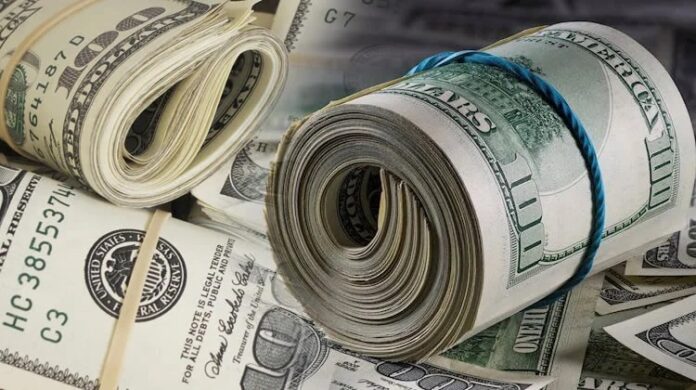LAGOS – The free fall of the Naira both at the official Nigerian Foreign Exchange Market (NAFEM) and the unofficial market has been attributed to the dollarisation of the economy.
As a result, the Central Bank of Nigeria (CBN) has been advised by financial experts to put a stop to it by deemphasising the use of US dollars for any transaction in the country
While the CBN is thinking in this direction, a source said the bank has started clamping down on some new-generation banks for hoarding FX and creating artificial scarcity in the country.
“CBN clampdown and probe of banks hoarding dollars has commenced. For instance, a new generation bank believed to have hoarded $1 billion in its UK subsidiary is under investigation and the CBN plans to partner with the UK’s Financial Conduct Authority to trace the source of the dollars which were released for seemingly genuine business requests. The presidency is also said to be aware of the probe,” the source informed Daily Independent.
However, speaking on strategies that can be used for the naira to regain strength, the founder and chief consultant of B. Adedipe Associates Limited (BAA Consult), Dr. Biodun Adedipe, said the CBN should stop government agencies from charging local operators and entities in US dollars.
READ ALSO: Lagos Establishes LACE Fish Centre, Targets 10,000 New Jobs
According to him, the sale of crude oil to local refineries should also be made in Naira rather than in US dollars.
Adedipe said, “CBN should deal transparently with participating banks at the I&E Window. De-dollarise the economy by declaring as illegal any local transactions in US dollars (sale of assets, rent/leases, and other services, including school fees and medical bills) and ensure that government agencies stop charging local operators and entities in US dollars (quite common in the maritime sector).
“Other suggestions include the need to ensure that the sale of crude oil to local refineries should be made in Naira rather than the dollar.“
“President Bola Tinubu should have a direct engagement with bank CEOs to generate ideas and use moral suasion to enlist their support for the market reforms. Face the reality that unified exchange rates (not any different than floating the Naira) is a poor policy choice for a structurally defective and weak economy like ours,” he added.
Adedipe said Nigeria’s USD GDP will continue to shrink under the unified exchange rates regime, arguing that largely import-dependent economic activities and lifestyle with a low domestic production base are a recipe for unabated depreciation.
“In this case, a growing Naira-denominated GDP will become irrelevant insofar as the exchange rate depreciation is faster!” he concluded.
Also speaking, the Chief Executive Officer, of the Centre for the Promotion of Private Enterprise (CPPE), Dr Muda Yusuf, said there is no silver bullet in the treatment of the current fate of the naira.
“These can be fresh flow from oil sales or IMF support which is also a possibility because other measures had been exhausted by the immediate management of the apex bank.”
However, the Association of Bureau De Change Operators of Nigeria (ABCON), has asked the CBN to allow BDCs to carry out online dollar operations and Point of Sale (POS) agency as part of measures to boost liquidity in the forex market and ensure exchange rate liquidity.
ABCON also urged the apex bank to give regulatory approvals to allow BDCs to have access to diaspora remittances, like receiving International Money Transfer Operators (IMTOs) proceeds.
According to a report by Nairametrics, the ABCON President, Aminu Gwadebe was quoted as saying that full participation of BDCs in the retail segment of the foreign exchange market will help achieve a stable, strong, and virile exchange rate.
Gwadabe said that ABCON recommended that the apex bank should approve its overdue request that BDCs be made agents through which over $20 billion in annual inflows from the diaspora enter the economy.
READ ALSO: CBN, NESG: When Things Fall Apart
He noted that securing such regulatory approval will boost dollar liquidity and strengthen the naira.
On their part, analysts from Cordros Capital said unless there is a direct and deliberate intervention to halt the slide, the incentives for holding the naira will continue to be limited.
In the company’s latest report at the weekend, the analysts said: “Given the CBN’s unbanning of importers of all the 43 items previously restricted from the NAFEM in 2015, the market realised that FX supply is still minimal at the official market faster than we anticipated. Accordingly, importers have returned to the parallel market to fulfill their FX obligations. In addition, the incentives for holding the naira continue to be limited by the day, coupled with the panic-buying arising from the expectations of further currency pressures amidst limited FX supplies. Consequently, barring any significant FX inflows or convincing action by the policymakers to turn the tide, we expect the exchange rate pressures to linger in the short term.”
In its recent report published by Forbes Africa, Fitch Ratings highlighted the widening gap between the official and parallel market rates as an indicator of the challenges in maintaining exchange-rate liberalization and suggested the possibility of further devaluation.





















